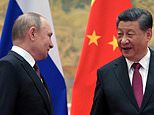China ‘launched huge cyber-attack’ on Ukraine days before Russia invaded, Kyiv intelligence claims
China ‘launched huge cyber-attack’ on Ukraine’s military and nuclear infrastructure days before Russia invaded, Kyiv intelligence claims
Ukraine’s intelligence agency confirmed Chinese cyber attacks before the warThe Chinese reconnaissance attacks peaked the day before Russia’s invasionExperts say the moves contradict Xi Jinping’s claims to have not known about Vladimir Putin’s invasion plans in advanceIf proven, the attacks could be seen as support for the Russian war effort and lead to sanctions on China
<!–
<!–
<!–<!–
<!–
(function (src, d, tag){
var s = d.createElement(tag), prev = d.getElementsByTagName(tag)[0];
s.src = src;
prev.parentNode.insertBefore(s, prev);
}(“https://www.dailymail.co.uk/static/gunther/1.17.0/async_bundle- -.js”, document, “script”));
<!–
DM.loadCSS(“https://www.dailymail.co.uk/static/gunther/gunther-2159/video_bundle- -.css”);
<!–
China have been accused of launching a flurry of cyber attacks on Ukraine’s military and nuclear infrastructure days before Russia’s invasion – indicating initial support for Putin‘s war.
Intelligence memos from the SBU, Ukraine’s spy agency, claim that more than 600 websites belonging to Ukraine’s ministry of defence were attacked by the Chinese government, according to The Times.
Despite the Chinese government’s lukewarm public reaction to the invasion of Ukraine, the move indicates prior knowledge of the invasion plans on the part of Xi Jinping‘s government before troops entered on February 24.
The cyber attacks indicates prior knowledge of the invasion plans on the part of Xi Jinping’s government before Russian troops entered Ukraine on February 24
The SBU said they had identified the source of the attack because the tools and methods used were consistent with the common tactics of the cyber warfare wing of the Chinese armed forces.
Speaking to the Times, the SBU said that border defence, banking and railway infrastructure was targeted with a computer network exploitation (CNE) intended to gather information about Ukrainian weaknesses.
The SBU said there was an ‘increase in activity against our country’s networks in mid-February’ from both Russian and Chinese hackers which peaked on February 23.
The agency added: ‘Intrusions that are of particular concern include the CNE campaigns directed at the State Nuclear Regulatory Inspectorate, and the Ukrainian Investigation Website focused on Hazardous Waste.
‘This particular CNE attack by the Chinese cyberprogram included the launch of thousands of exploits with attempts pointed to at least 20 distinct vulnerabilities.’
US intelligence sources confirmed that the Ukrainian sources were accurate to the Times but British sources would only confirm they were investigating the attack.
The attacks contradict President Xi’s denial that China had prior knowledge of the invasion plans and had asked Vladimir Putin to delay the war until the end of the Beijing Winter Olympics.
At a meeting at the start of the Beijing Olympics, Xi and Putin signed a declaration of friendship – adding that there were ‘no limits’ on the scope of cooperation between the two dictatorships.
Tom Hegel, a threat researcher at US-based cybersecurity firm SentinelOne, told the Times: ‘It sounds like [the Chinese] didn’t care that they were seen — they had an objective to get in and get what they needed as quickly as possible.
‘It’s abnormal for a CNE-type effort, it stresses the importance of what they knew was coming.’
Beijing has been careful to not outright support or condemn the invasion, fearing potential sanctions from the West if they are seen to be supporting the invasion of Ukraine.
Steve Tsang, director of the Soas China Institute, told the Times: ‘The number of people China has engaged in cyberoperations is enormous. A lot of them are part of the People’s Liberation Army, which is part of the [Chinese Communist] party.
‘We all believe that they have a cyberforce that attacks states.
‘They have been more engaged in getting information rather than shutting people down.
President Volodymyr Zelensky’s government were provided with cyber defence support from US private contractors between October and January
‘If they’re working in Ukraine they’re working in support of Russians. The implications of this would be they are potentially subjected to sanctions.’
Sam Cranny-Evans, an intelligence and surveillance expert at the Royal United Services Institute, a think tank, said: ‘The attacks suggest a certain level of collusion between Russia and China, which may prompt revised assessments of the nature of the relations between Russia and China, and the willingness of the two nations to support each other in military operations.
‘It may also raise questions about what other support Beijing will provide Russia’s operation in Ukraine, and the potential for this to prolong the conflict.
‘At the capability level, it is interesting that the Russian security apparatus involved Chinese actors in this operation; they are typically quite capable and committed considerable resources to the intelligence operation in Ukraine in the lead-up to the conflict. The FSB for instance, had a staff of 200 personnel focused on gathering human intelligence in Ukraine, which included cyberattacks to gather information on the population.’
As invasion fears mounted in October 2021, the US sent private contracts to bolster the Ukrainian cyber defences, a move which has led to successful defences of the country’s digital infrastructure since the war began.
Juan Andrés Guerrero-Saade, principal threat researcher at SentinelOne, told the Times: ‘Credit to the Ukrainian government, I don’t know what they’ve done with [their] computer emergency response team, but they are killing it.
‘It’s very plausible that the US government is helping or that they have other companies on the ground — no one we know has owned up to that yet. There’s something going on there.’
![]()


